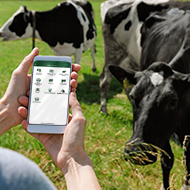
Free app allows farmers to quickly record and share cattle data.
A new app created by the Veterinary Services team at Scotland’s Rural College (SRUC) will allow British beef suckler farmers to share real-time cattle data with veterinary surgeons while in the field.
The Herd Health Planning app is free for Scottish farmers registered to the Animal Health Planning System (SAHPS) and available to others for a small subscription. It is also connected to the British Cattle Movement Service’s tracing system (BCMS).
All data is stored locally on the app while the farmer is out in the field and then sent to both BCMS and SAHPS systems as soon as Wi-Fi or mobile data becomes available.
The app also includes an e-medicine book which complies with farm assurances and other statutory requirements.
Now downloadable for Android and Apple devices, the Herd Health Planning app allows farmers to:
- quickly communicate herd health to their veterinary surgeon
- download all cattle currently on the holding through BCMS
- record bulls in and out dates
- record movements, births and deaths and upload them to BCMS
- record disease incidents and production data
- record animal treatments, creating the e-medicine book.
Health planning development manager Dr Foteini Manolaraki said: “We recognise that time is a precious commodity for today’s farmers. Rather than taking notes while out in the field or in the shed and then copying them into the computer, this new app allows them to share their cattle data with their vet while on the move.
This information is then shared multiple times via BCMS and SAHPS software, which could allow earlier vet intervention if necessary.”
For more information or to sign up to the app, visit www.sahps.co.uk



 The Federation of Independent Veterinary Practices (FIVP) has announced a third season of its podcast, Practice Matters.
The Federation of Independent Veterinary Practices (FIVP) has announced a third season of its podcast, Practice Matters.